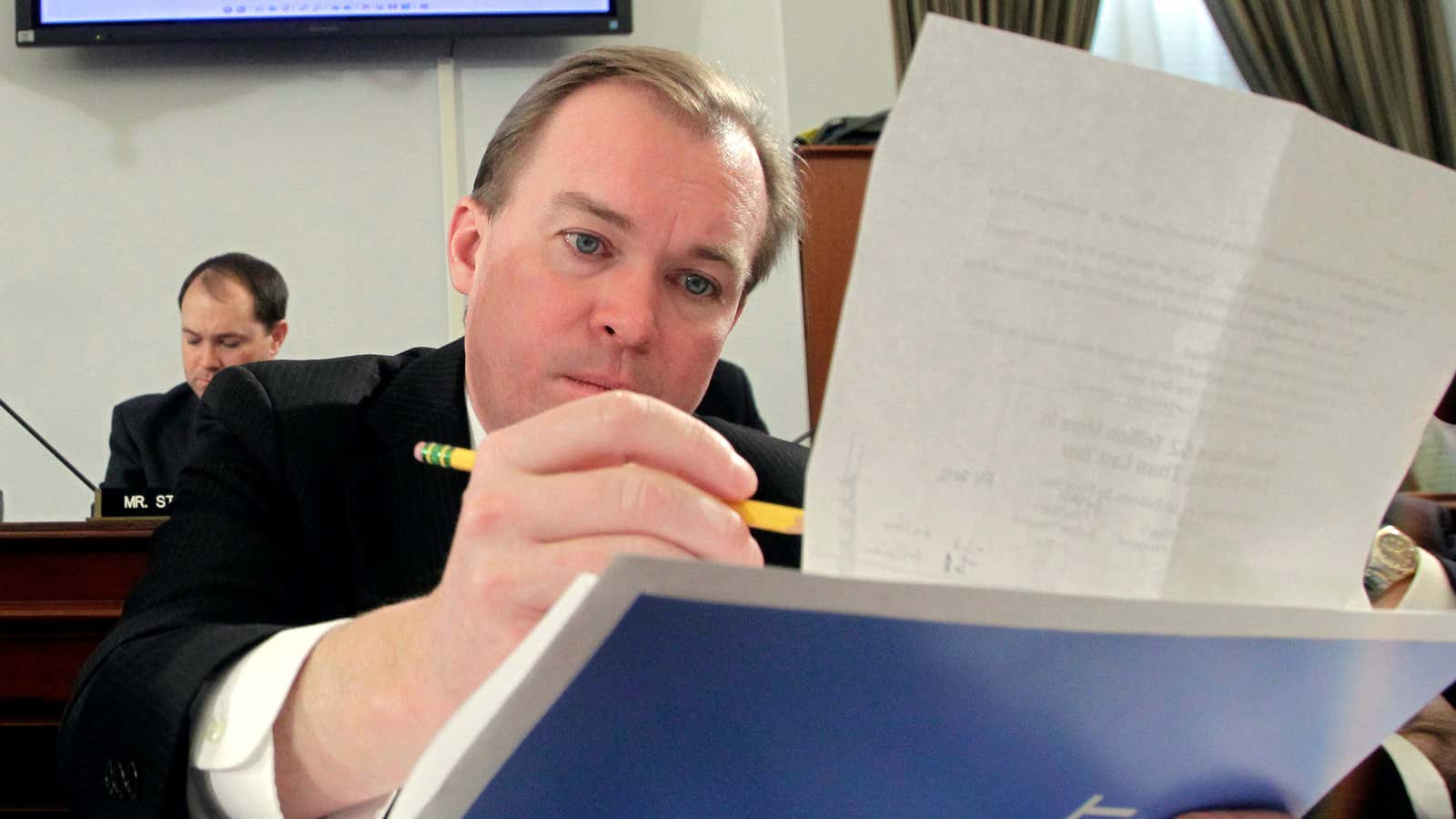When America’s credit hung in the balance, representative Mick Mulvaney headed to the congressional chapel to pray.
Now he’s headed to the White House to lead Donald Trump’s Office of Management and Budget, the nerve center of government activity and a key voice in American fiscal debates. It’s not a big surprise that Trump would appoint a dedicated spending-slasher to the role. But financial markets will note that that this particular OMB director has a haphazard attitude toward America’s credit.
Back in 2011, the first generation of conservative lawmakers elected in response to Barack Obama came to the capital intent on forcing a clash over their spending priorities; Mulvaney was one of them.
One tool they would use was the debt ceiling, a statutory limit on US debt intended to make government borrowing simpler. The ceiling doesn’t directly affect how much the government spends on credit—Congress’ tax and spending decisions do that—but Republicans saw an opportunity in refusing to lift it. By threatening to stop paying the bills for spending Congress already approved, they could force spending cuts past a liberal president and Democratic senate. An actual failure to raise the debt ceiling could result in economic catastrophe—a scenario so complicated we had to make a flowchart to explain it.
Markets were spooked when Treasury secretary Tim Geithner announced in May of that year that the US was effectively out of money because it could no longer borrow, and would suspend normal operations to find the government equivalent of loose change in the couch cushions. When then-House speaker John Boehner was hunting for lawmakers to vote for a compromise bill to keep the government open, Mulvaney departed to the chapel to reflect. He would vote ”no” on the deal.
“I have never believed the threat that this country will default on its debt as a result of any failure to raise the debt ceiling,” he said in a statement at the time.
Markets disagreed, with US equities plunging as investors fled, ironically, to US Treasurys for safety, even as the government itself faced higher borrowing costs.
The US went to the fiscal brink, lost its sterling AAA credit rating, and ultimately saw taxpayers lose $18.9 billion in higher interest-rate payments. By August, Republicans and Democrats had agreed to a framework designed to force the two parties to the negotiating table in the years to follow. Mulvaney opposed that, too.
When no comprehensive bargain materialized in 2012, the two parties adopted across-the-board spending cuts known as the sequester. In 2013 and 2014, Republicans demanded cuts to Obamacare and other wish-list items in exchange for lifting the debt limit, but failed to win anything more than cosmetic concessions. In 2015, Boehner made a two-year deal to suspend the debt limit—but only after the negotiations cost him his speakership. A group of conservative lawmakers calling themselves the Freedom Caucus, including Mulvaney, ousted him in favor of current speaker Paul Ryan.
Next year, that deal will expire. And Mulvaney will be one of the people asking Congress, nicely, to please raise the debt limit again. Anything other than an increase will force the government to take actions leading to either dramatic cuts in vital federal spending, or a constitutional crisis (remember that flow chart?). And that’s before Trump’s plans to cut taxes on the wealthy and increase defense spending.
Traditionally, the president’s party is expected to deliver most of the votes to raise the debt ceiling. Historically, Republican fiscal hawks have tended to abandon their probity as soon as they gain the White House (see the recent Bush administration’s tax cuts, wars, and Medicare part D), with tax cuts erasing all other sins. Perhaps securing the votes won’t be a problem, but the identity of many new-generation House Republicans is predicated on opposing increases in the debt limit.
A fight between Trump’s profligate priorities and hardliners in Congress could trap Mulvaney between his old allies and his new boss—especially if Trump is paying attention to his top economic adviser, Goldman Sachs’ Gary Cohn. Any disagreement could give Democrats a window to demand concessions in exchange for votes, but brinksmanship could also be more dangerous than past years, as rising interest rates raise the specter of bond vigilantes.
Investors made complacent by two fiscal-crisis-free years should mark their calendars for March 16, when the debt limit expires, and start saying their prayers.
